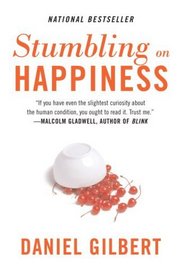Helpful Score: 9
Pretty fascinating stuff. Not a self-help book, but rather a psychological study about the way our minds work.
Helpful Score: 4
I thought the first chapter was pretty boring but was glad I kept reading because it has some fascinating things that will make you think twice about some of your beliefs. Ever wonder why you and others who were at the same place at the same time have different stories about the same events? No it isn't because you have a great memory and they don't remember correctly. This book will give you the answer to this and challange many other ideas you beleive to be true.
Helpful Score: 3
My husband was reading this book and ditched it because he found it rather tedious to read. It's a pure psychology book, and judging by his reaction, people who read books about psychology and how the mind works are going to enjoy this far more than the average person. It was not written in a way that made it interesting for someone like my husband, who has a more casual interest in the subject matter.
Helpful Score: 2
This book is not a self-help book, but rather should appeal to those with an interest in psychology or sociology. Gilbert examines why our imaginations mislead us when we envision what will make us happy in the future. He uses as examples results of a number of experiments, and occasionally touches on economics and biology.
I enjoyed the author's writing style - he is very humorous, and writes in a way that makes his topic accessible. Also, he frequently recaps findings from previous chapters, which is good for someone like myself who tends to space out occasionally or start thinking about something else while reading. :-)
I enjoyed the author's writing style - he is very humorous, and writes in a way that makes his topic accessible. Also, he frequently recaps findings from previous chapters, which is good for someone like myself who tends to space out occasionally or start thinking about something else while reading. :-)
Helpful Score: 2
STUMBLING ON HAPPINESS is written by a renouned Harvard psychologist. If you are looking for a book on how to become happy, this book is not for you. But, if you are interested in scientific research,in philosophy, psychology or cognetive neuroscience, this book offers much insight into the unique human ability to imagine the future.
Gilbert gives a scientific way of looking at happiness and imagination. I enjoyed reading the book because it gave me a new perspective on how I look at things and how my mind processes my memories and what I might imagine in the future. A great read if you're interested in background information.
I really enjoyed reading this book, it was fascinating.
I found this book disappointing, worthy perhaps of a much shorter essay or article. The thesis was quite commonplace, and the examples were not very riveting.
Very similar to Malcolm Gladwell's books in concept. At little too much theory and not quite enough practical examples though.
This was an enjoyable read, but left me a little dissatisfied at the end. After the whole book describing the shortfalls of human imagination and prediction, there's no real "solution". The author even admits there is no solution - which takes the edge off a little.
I'd recommend this book to anyone interested in how their own brain works - and doesn't work - as you navigate through your life.
This was an enjoyable read, but left me a little dissatisfied at the end. After the whole book describing the shortfalls of human imagination and prediction, there's no real "solution". The author even admits there is no solution - which takes the edge off a little.
I'd recommend this book to anyone interested in how their own brain works - and doesn't work - as you navigate through your life.
This book pretty much stunk. It had nothing new or interesting in it. I am sick of these kinds of books!
Humorously written and thoughtfully researched, this is a Brain-Games-esque romp through the foibles of human prospection. It's a mix of sociology, psychology, and cognitive neuroscience that will teach you why you've made all those dumb choices, and why you're likely to do it again.
Though not at all a handbook on finding your happiness, Gilbert's thesis (no spoilers here) is simple and powerful. It's one of the few nonfiction books that's made me laugh, literally, out loud.
Though not at all a handbook on finding your happiness, Gilbert's thesis (no spoilers here) is simple and powerful. It's one of the few nonfiction books that's made me laugh, literally, out loud.
Different not what i expected. More like a pyschology book.
Some very interesting points, but also some seeming inconsistencies in research that are not addressed.




